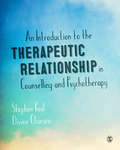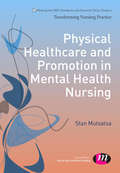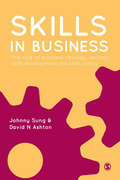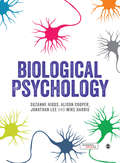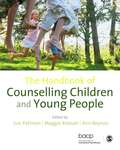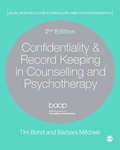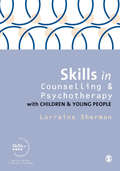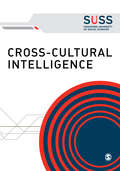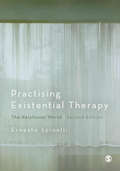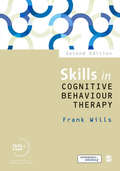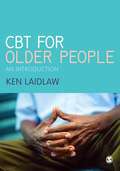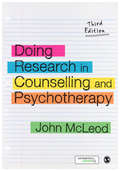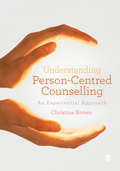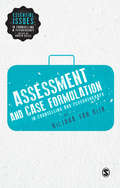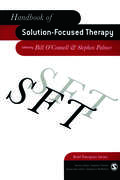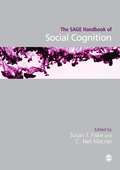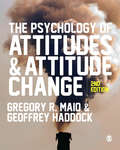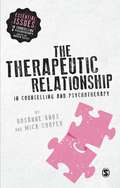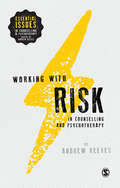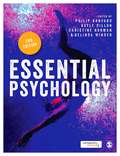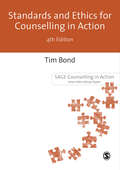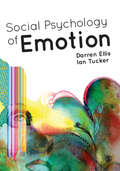- Table View
- List View
An Introduction to the Therapeutic Relationship in Counselling and Psychotherapy
by Stephen Paul Divine CharuraThe therapeutic relationship is considered to be the most significant factor in achieving positive therapeutic change. As such, it is essential that trainee and practising therapists are able to facilitate a strong working alliance with each of their clients. This book will help them do just that, by offering a practical and evidence-based guide to all aspects of the therapeutic relationship in counselling and psychotherapy. Cross-modal in its approach, this book examines the issues impacting on the therapeutic relationship true to all models of practice. Content covered includes: - The history of the therapeutic relationship - The place of the therapeutic relationship in a range of therapy settings, including IAPT - Concepts and practical skills essential for establishing and maintaining a successful working alliance - The application of the therapeutic relationship to a variety of professional roles in health and social care - Practice issues including potential challenges to the therapeutic relationship, working with diversity and personal and professional development - Research and new developments Using examples, points for reflection and chapter aims and summaries to help consolidate learning, the authors break down the complex and often daunting topic of the therapeutic relationship, making this essential reading for trainee and practising therapists, as well as those working in a wider range of health, social care and helping relationships.
Physical Healthcare and Promotion in Mental Health Nursing (Transforming Nursing Practice)
by Stanley MutsatsaIt is essential for mental health nurses to understand the physical health needs of people with mental health disorders in order to provide holistic care. Yet these people often have their physical health needs unrecognised or poorly managed. This book is a practical and informative guide to the physical health care of people with mental health illnesses. It covers a range of health-promotion strategies, including exercise, diet and oral health, and assessment, intervention and skills for common physical disorders found in people with mental-health problems. It takes a recovery perspective and emphasises the importance of communication and collaborative care for adherence to healthy lifestyles.
Skills in Business: The Role of Business Strategy, Sectoral Skills Development and Skills Policy
by Johnny Sung David N Ashton"Johnny Sung and David Ashton are two of the leading scholars in the area of skills. This book combines challenging theories with cutting edge research in a way that should bring skills to life for students. I strongly recommend it for anyone researching or studying in this area." - Irena Grugulis, Leeds University Business School "A much needed contribution to the complex debate of how skills can best be utilised to enhance company performance, with particular emphasis on an innovative sectoral approach. It is a model of clarity in its presentation of the authors' conceptual models using a historical narrative as well as comparative case studies in both the UK and Singapore." - Bert Clough, Leeds University Business School Public skills policy in most market economies in the last forty years made one repeated error, time and again. We seem to be unable to learn from those mistakes. Consistently, public policies view a wide range of economic and social issues e.g. low productivity, low-skilled jobs, low wage, inequality and in-work poverty as the consequence of skills deficits and a lack of qualifications held by individual workers. Whilst mis-diagnosing the source of the problems and failing to deliver any effective change, public skills policies continue with a policy prescription of 'more skills' and 'more degrees'. If we have not solved the problems with this decade-old approach, why should the same medicine work this time? This book examines the role of public skills policy from a completely different perspective. It starts by challenging the lack of a systematic analysis of the link between skills utilisation and business strategy, and provides a new model for fresh thinking. The book extends this theoretical analysis to examine the implications for the sectoral approach to skills development as a more effective form of public skills policy. David N. Ashton is Emeritus Professor at the University of Leicester and Honorary Professor at Cardiff University. Johnny Sung is at The Institute for Adult Learning, Singapore Workforce Development Agency, Singapore.
Biological Psychology
by Mike Harris Dr Suzanne Higgs Dr Jonathan H. Lee Dr Alison CooperWritten to guide undergraduate students new to brain and behaviour through the key biological concepts that determine how we act, Biological Psychology provides a comprehensive introduction to the subject. It includes detailed coverage of sensation, movement, sleep, eating and emotions, with further chapters on the biological basis of psychological disorders and the effects of drug-taking. Uniquely, the authors emphasize the importance of learning and memory as a key thread throughout and include advanced chapters on key research areas that push discussion further and encourage critical thinking, making this book appropriate for undergraduates studying biological psychology at any level. Key features include: 'Spotlights' offering insights into key areas of research that expose the most important developing issues in the field today A clear structure including roadmaps and key points for each chapter to ease navigation through the book and understanding of the links between concepts Full colour presentation to bring the topics to life through clear and comprehensive illustrations and diagrams A companion website at study.sagepub.com/higgs with a range of materials for instructors and students
The Handbook of Counselling Children & Young People
by Sue Pattison Ann Beynon Maggie RobsonThis landmark handbook brings together the fundamentals of counselling children and young people theory, research, skills and practice. It addresses what every successful trainee or practitioner needs to know in a way that is comprehensive, accessible and jargon-free. Divided into four parts, it covers: theory and practice approaches, including chapters on child development, person-centred, psychodynamic, CBT, Gestalt approaches, and more counselling process, including chapters on the therapeutic relationship, skills, groupwork, supervision practice issues, including chapters on law and policy, ethics, diversity, challenging behaviour practice settings, including chapters on health and social care settings, school and education, multi-agency and collaboration. Each chapter includes a chapter introduction and summary, reflective questions and activities, helping trainees to cement their learning. With chapters contributed by leading experts and academics in the field, this book is essential reading for trainees and practitioners working with children and young people.
Confidentiality & Record Keeping in Counselling & Psychotherapy (Legal Resources Counsellors & Psychotherapists)
by Tim Bond Barbara MitchelsThis indispensible text is your students' first point of reference when faced with a situation or dilemma of a legal nature regarding record keeping or confidentiality issues. Reflecting changes in policy and law and developments in practice since its last publication in 2008, this new edition has been expanded into 14 new and thoroughly revised chapters. New content includes: - The latest Data Protection Act guidance including data protection implications when working with technology and for online therapy - Greater content on sharing information, including sharing information in supervision, training, research, audit and, crucially, across professions - Expanded content on mental capacity with separate chapters for children and vulnerable adults - A new chapter on pre-trial therapy with adults and children, including Special Measures, Crown Prosecution Service guidance and victim support - A new chapter on practice dilemmas, providing advice and encouraging further discussion and reflection - The role of supervision and of the supervisor Using reflective questions, sample dilemmas and case scenarios throughout, the authors illustrate how to practically address the difficult confidentiality and record keeping issues that therapists regularly face. Current legal guidelines and frameworks are interspersed throughout the book which, along with revised disclosure checklists and links to useful organisations and contacts, ensure trainee and practising therapists are well versed in current best-practice.
Skills in Counselling and Psychotherapy with Children and Young People (Skills in Counselling & Psychotherapy Series)
by Lorraine ShermanAs interest and training in counselling children and young people continues to grow, it is essential that counsellors are equipped with the skills to work with this client group. In this book, Lorraine Sherman draws on her years of experience in the field to provide a practical resource for qualified and trainee counsellors, providing them with the necessary skills to ensure best practice with children and young people. Distinguishing between working with young children and with adolescents, skills covered include: - establishing a therapeutic relationship - assessing a young client - contracting - counselling practice - understanding and maintaining confidentiality and disclosure Using case studies and examples to help demonstrate skills in action, this is essential reading for anyone planning to become or already engaged in the helping professions with young people.
UniSIM Reader for Cross-cultural Intelligence
by Sage SageSSC263 Cross-Cultural Intelligence is primarily concerned with the ways in which an individual may come to understand the nuances of an unfamiliar culture (i.e., a culture other than his or her own). It aims to develop in students an appreciation of the unfamiliar culture’s values, norms and beliefs on its own terms by teaching them to compare and contrast the similarities and differences between an unfamiliar culture and his or her own culture, as well as between two or more unfamiliar cultures. In a broader sense, it aims to enable students to take the appropriate steps to dismantle the barriers to intercultural communication, intelligently adapt to unfamiliar cultural settings, manage conflicts and behave appropriately and according to the cultural and social contexts so as to function effectively within unfamiliar cultural contexts and build lasting relationships with people from a different culture.
Practising Existential Therapy: The Relational World
by Ernesto SpinelliDrawn from the author's experience as an internationally-recognised theorist, lecturer and practitioner, this practical book elucidates the notoriously difficult and distinctly different therapeutic approach, existential therapy. Balancing theory and practice, the book provides trainees with an accessible introduction to the author's own three phase structural model for existential therapy, one which has become widely established and used in training and practice. Substantially revised and updated throughout, Part One examines the philosophical underpinnings, essential theory and distinctive features of existential therapy while Part Two goes on to present the author's structural model for practice. Both parts are now prefaced by useful schematic overviews which introduce the content and pinpoint key themes in each chapter, helping readers to navigate the text with ease. Practical exercises encourage further engagement with the text and the themes, issues and practices under consideration. Seen by existential therapists across the world as one of the most influential books on the topic, this new edition is an essential read for all those training, practising or interested in existential therapy.
Skills in Cognitive Behaviour Therapy (Skills in Counselling & Psychotherapy Series)
by Frank WillsThis step-by-step guide to the core skills and techniques of the cognitive behaviour approach is suitable for those with little or no prior experience in CBT. The author uses case examples from a variety of settings to illustrate the skills needed at each stage of the therapeutic process, and brings the therapeutic relationship to the foreground to show you how to build and maintain a successful working alliance with your clients. This second edition includes new content on: - the historical foundations of CBT - common presenting issues, such as depression and anxiety - third wave CBT - IAPT - insights from other approaches, relevant to trainees in other modalities with an interest in CBT Accompanied by a new companion website (https://study.sagepub.com/wills), which includes additional case studies, template forms, PowerPoint presentations for each chapter, and a wealth of material for further reading, this is an essential text for anyone wishing to hone their therapeutic skills in CBT.
CBT for Older People: An Introduction
by Kenneth LaidlawGoing beyond simple procedural modifications, this is the first book to address how the application of gerontology to CBT practice can augment CBT's effectiveness and appropriateness with older people. Taking you step-by-step through the CBT process and supported by clinical case examples, therapeutic dialogue, points for reflection and hints and tips, the book examines: - basic theoretical models in CBT and how to relate them to work with older people - main behavioural interventions and their practical application - social context and relevant theories of aging - implications of assessment, diagnosis and treatment - issues of anxiety, worry and depression, and more specialist applications of CBT for chronic illnesses - latest developments, thinking and empirical evidence. This is an invaluable companion for any clinical psychology, counselling, CBT/IAPT, and social care trainee or professional new to working with older people, especially those who are keen to understand how the application of CBT may be different. Professor Ken Laidlaw is Head of the Department of Clinical Psychology, University of East Anglia.
Doing Research in Counselling and Psychotherapy
by John McLeodFrom leading researcher and bestselling author, John McLeod, this substantially rewritten and restructured third edition is the most accessible and comprehensive 'how to' guide on conducting a successful research project in counselling and psychotherapy. Taking you step-by-step through the research process, this new edition includes: A list of 9 basic principles for doing meaningful and practically useful research Chapters on basic research skills: developing a research question, critically evaluating research studies, compiling a research proposal, using qualitative and quantitative methods, and fulfilling the requirements of ethics committees Chapters on 5 main types of research product that can be accomplished by novice researchers: qualitative interview studies, systematic case studies, practice-based outcome research, autoethnographic inquiry, and publishable literature reviews Guidance on how to get your work published. Supported by a companion website (https://study.sagepub.com/mcleod) offering relevant journal articles, sample ethical consent forms, links to open access research tools and more, this is an indispensable resource for any counselling trainee or practitioner learning about the research process for the first time. John McLeod is Emeritus Professor of Counselling at the University of Abertay Dundee.
Understanding Person-Centred Counselling: A Personal Journey
by Christine BrownThis book provides a key introduction to the theory, concepts and practice of the person-centred approach, through the lens of the practitioner's experience and personal development. Writing as someone who has been through real life challenges and has developed and learned as a result, the author's strikingly personal style not only helps to contextualise complex and nuanced theory, but makes this a truly unique book about real person-centred practice and experience. From Roger's early philosophy through to the current developments and controversies in the field, the author uses personal testimonies, exercises and reflection points to make challenging concepts and practice issues accessible for the novice reader. What results is an informative and fascinating read for all those training and interested in the person-centred approach.
Assessment and Case Formulation in Counselling and Psychotherapy (Essential Issues in Counselling and Psychotherapy - Andrew Reeves)
by Biljana Van RijnThis is a thorough and well-structured piece of work, which brings in the recent work of excellent authorities such as Barbara Ingram. It is well arranged, with many examples and case vignettes, which bring the material to life in an engaging way. I enjoyed reading it, and would recommend it unreservedly.' John Rowan, humanistic therapist, private practice 'This is a must-read book for students on courses in counselling, psychotherapy, clinical psychology and psychiatry.' Heather Fowlie, Head of the Transactional Analysis Department, Metanoia Institute, London Conducting a competent assessment and case formulation can be a daunting task for trainee therapists engaging in clinical assessment for the first time. This book is designed to help, by unpicking the many aspects involved in assessment and case formulation across modalities, practice settings and client groups. The book: · Explores key elements of clinical assessment including diagnosis, risk assessment, ethical considerations and accounting for difference. · Highlights the necessary skills, techniques and legal requirements at each stage of the process. · Takes into account the impact of culture, context and theoretical and practical considerations. · Uses case studies and reflective questions to illustrate difficult concepts in context. Equipping you with the knowledge and tools to make successful assessments and case formulations, this is an essential read for trainees and for qualified practitioners wishing to brush up on their understanding. Dr Biljana van Rijn, Faculty Head of Applied Research and Clinical Practice, Metanoia Institute.
Handbook Of Solution-Focused Therapy
by Bill O'Connell Stephen PalmerOn a scale of 0-10 I would give the Handbook of Solution Focused Therapy a nine - it met my best hopes in terms of an insight into the theory and mechanics of SFT, and gave me ideas for extending my current use of the therapy. I found it engaging, readable and well-presented, with useful reference lists within each chapter to guide further reading' - Solution News `This collection of fifteen chapters, each written by a different specialist in the SFT field, is a valuable contribution to the Solution-Focused therapist's bookshelf. A must-read for any informed SF therapy practitioner - Mark McKergow, The Solutions Focus `This book has 14 chapters on diverse applications of Solution-Focus, between introductory and closing chapters by Bill O'Connell. The book relates to work being done in the UK and in Ireland, excepting Alasdair MacDonald's piece on research in SFT, which is an up-to-date and welcome review of research findings world-wide. All the chapters are succinct and they convey a clear impression of the lightness and excitement of this approach, for service-users and therapists alike. The book is a good read for any therapist, professional helper or service manager' - Robert Cumming , Nurturing Potential Solution-Focused therapy is an increasingly popular approach, used by practitioners in a wide range of contexts and settings. Illustrating the breadth and depth of contemporary practice, the Handbook of Solution-Focused Therapy brings together contributions from leading practitioners in fields such as social work, education and health care to show how solution-focused techniques can be effective in many different situations. Beginning with an introduction to the origins and theory of the approach, the book examines different areas of practice, explaining how and why the solution-focused approach is applicable and highlighting the issues specific to each context. Each chapter features a case-example, which demonstrates the practical advantages and difficulties, involved in using the solution-focused approach. The Handbook of Solution-Focused Therapy is an ideal text for training courses in solution-focused therapy and a source of new ideas for practitioners trained in other approaches who want to integrate solution-focused techniques with their existing practice. Bill O'Connell is a Senior Lecturer in Counselling at University of Birmingham and author of Solution-Focused Therapy (SAGE 1998) and Solution-Focused Stress Counselling (Continuum 2001). Professor Stephen Palmer is Director of the Centre for Stress Management and the Centre for Coaching, London. He has written and edited over 25 books.
The SAGE Handbook of Social Cognition
by Susan T. Fiske C Neil MacraeThe SAGE Handbook of Social Cognition is a landmark volume. Edited by two of the field's most eminent academics and supported by a distinguished global advisory board, the 56 authors - each an expert in their own chapter topic - provide authoritative and thought-provoking overviews of this fascinating territory of research. Not since the early 1990s has a Handbook been published in this field, now, Fiske and Macrae have provided a timely and seminal benchmark; a state of the art overview that will benefit advanced students and academics not just within social psychology but beyond these borders too. Following an introductory look at the 'uniqueness of social cognition', the Handbook goes on to explore basic and underlying processes of social cognition, from implicit social cognition and consciousness and meta-cognition to judgment and decision-making. Also, the wide-ranging applications of social cognition research in 'the real world' from the burgeoning and relatively recent fields of social cognitive development and social cognitive aging to the social cognition of relationships are investigated. Finally, there is a critical and exciting exploration of the future directions in this field. The SAGE Handbook of Social Cognition will be an indispensable volume for any advanced student or academic wanting or needing to understand the landscape of social cognition research in the 21st century.
The Psychology of Attitudes and Attitude Change
by Professor Gregory R. Maio Geoff HaddockWhat are your attitudes on climate change? Do you have opinions on how political parties should be funded? Or indeed, celebrity misadventure? Written by two world-leading academics in the field of attitudes research, this textbook gets to the very heart of this fascinating and far-reaching field. In the 2nd Edition, Greg Maio and Geoffrey Haddock expand on how scientific methods have been used to better understand attitudes and how they change, with updates to reflect the most recent findings. With the aid of a few helpful metaphors, the text provides readers with a grasp of the fundamental concepts for understanding attitudes and an appreciation of the scientific challenges that lay ahead. With plenty of learning aids to help with revision and a new companion website, this textbook is a valuable resource for anyone interested in learning or teaching about attitudes. Key features of the new edition: Key Terms, Key Points and a Glossary Research Highlights that illustrate interesting and important case studies and their findings Useful recaps of 'What we have learned' and 'What do you think?' questions at the end of chapters to get students thinking A new Companion Website (study.sagepub.com/maiohaddock) with useful material for both instructors and students
The Psychology of Attitudes and Attitude Change
by Professor Gregory R. Maio Geoff HaddockWhat are your attitudes on climate change? Do you have opinions on how political parties should be funded? Or indeed, celebrity misadventure? Written by two world-leading academics in the field of attitudes research, this textbook gets to the very heart of this fascinating and far-reaching field. In the 2nd Edition, Greg Maio and Geoffrey Haddock expand on how scientific methods have been used to better understand attitudes and how they change, with updates to reflect the most recent findings. With the aid of a few helpful metaphors, the text provides readers with a grasp of the fundamental concepts for understanding attitudes and an appreciation of the scientific challenges that lay ahead. With plenty of learning aids to help with revision and a new companion website, this textbook is a valuable resource for anyone interested in learning or teaching about attitudes. Key features of the new edition: Key Terms, Key Points and a Glossary Research Highlights that illustrate interesting and important case studies and their findings Useful recaps of 'What we have learned' and 'What do you think?' questions at the end of chapters to get students thinking A new Companion Website (study.sagepub.com/maiohaddock) with useful material for both instructors and students
The Therapeutic Relationship in Counselling and Psychotherapy (Essential Issues in Counselling and Psychotherapy - Andrew Reeves)
by Rosanne Knox Mick CooperUnravelling the issues surrounding the therapeutic relationship, this book highlights the importance of the relationship itself, of the client as a proactive agent in the process, and of the need for partnership and collaboration for effective therapy to take place. It will provide trainees and newly qualified therapists with the knowledge and skills they need to practice on a level of deep understanding and confidence.
Working with Risk in Counselling and Psychotherapy (Essential Issues in Counselling and Psychotherapy - Andrew Reeves)
by Dr Andrew ReevesThe wide-ranging contexts in which counselling and psychotherapy is now practiced means clients present with a range of risks that therapists have to respond to. Risk is an ever-present issue for counsellors and psychotherapists and, in an increasingly litigious culture, the need for trainees to develop a sound understanding of how the right tools and the right knowledge can support their practice has never been greater. In this book Andrew Reeves takes trainees, newly qualified practitioners, and more experienced practitioners step-by-step through what is meant by risk, offering practical hints and tips and links to policy and research to inform good ethical practice along the way. This book tackles: * The definition of risk and how risk is linked to social, psychological and relational factors * Working with those who are at risk of suicide, self-injury, self-harm and/or are an endangerment to others * How therapists should respond to the risk in situations involving child protection, mental health crises, and in the therapeutic process itself * The positive side of risk-taking * How counsellors and psychotherapists can work with risk proactively and positively, informed by research. Filled with case studies, ethical dilemmas, reflective questions, discussion questions and further reading, this book offers counsellors and psychotherapists guidance on how they can work with risk proactively and positively. It is an essential resource for all services, organisations and individual practitioners.
Essential Psychology: A Concise Introduction
by Philip Banyard Dr Belinda Winder Christine Norman Gayle DillonEssential Psychology returns for a second edition with a vivid narrative writing style designed for undergraduates, features designed to stimulate critical thinking and inspire students to learn independently, and an expanded companion website full of useful resources for lecturers and students. This comprehensive introductory text is relevant for both the specialist and non-specialist psychology student, challenging those who studied psychology before university while remaining accessible to those who did not. The 2nd edition: Gives students a firm foundation in all areas covered on accredited British Psychological Society degree courses Includes new chapters on psychopathology, research methods, language, motivation and emotion, lifespan development, health psychology, forensic psychology and critical social psychology Relates theory to the real world to help students think about where they will employ their degree after undergraduate study Comes with a SAGE edge companion website with a suite of resources to enhance the learning experience (edge.sagepub.com/banyard2e)
Essential Psychology: A Concise Introduction
by Philip Banyard Gayle Dillon Christine Norman Dr Belinda WinderEssential Psychology returns for a second edition with a vivid narrative writing style for undergraduates, features designed to stimulate critical thinking and inspire students to learn independently, and an expanded companion website full of useful resources for lecturers and students. This comprehensive introductory text is relevant for both the specialist and non-specialist psychology student, challenging those who studied psychology before university while remaining accessible to those who did not. The 2nd edition: Gives students a firm foundation in all areas covered on accredited British Psychological Society degree courses Includes new chapters on psychopathology, research methods, language, motivation and emotion, lifespan development, health psychology, forensic psychology and critical social psychology Relates theory to the real world to help students think about where they will employ their degree after undergraduate study Comes with a SAGE edge companion website with a suite of resources to enhance the learning experience (https://edge.sagepub.com/banyard2e)
Standards and Ethics for Counselling in Action
by Tim BondSAGE celebrated the 20th Anniversary of the Counselling in Action in November 2008. To view the video - click here ------------------------------------------------------ 'This book is very comprehesive and a useful addition to the reading list for healthcare students' 'Excellent student text' 'Invaluable text' `This edition retains the same informative and accessible style and broadly the same order of contents as the First Edition, which makes it easy for readers to track down key changes. The author's extensive experience in the field of ethics in counselling and his experience as Chair of BACP underpin this updated, essential and authoritative Second Edition' - British Journal of Guidance and Counselling 'Tim Bond has done a great service to the counselling profession by writing, and now updating, this book… His particular strength must surely be his clarity in acquainting counsellors with the complexities of British law. After an introduction, he starts with an exploration of the origins and scope of counselling. He then exemplifies cases in which a counsellor's personal and professional values collide. He has collected together a host of ethical dilemmas that counsellors might have to face' - Naomi Stadlen, Journal of the Society for Existential Analysis This highly acclaimed guide to the major responsibilities which trainees and counsellors in practice must be aware of before working with clients has now been fully revised and updated. The Second Edition examines issues fundamental to the process of counselling. A wide range of ethical problems are discussed and advice is given for resolving these dilemmas. Tim Bond outlines the values and ethical principles inherent in counselling and points out that the counsellor is at the centre of a series of responsibilities: to the client, to him/herself as a counsellor and to the wider community. He covers topics such as: confidentiality; legal aspects of counselling; working with suicidal clients; false or recovered memory; record- keeping; and the importance of adequate supervision.
Standards and Ethics for Counselling in Action (Counselling in Action series)
by Tim BondGet 24 months FREE access to an interactive eBook* when you buy the paperback! (Print paperback version only, ISBN9781473913974) To find out more visit: https://study.sagepub.com/counsellingethics Textbook with free access to counselling videos and other digital resources! The fourth edition of this classic text includes FREE access to an interactive eBook edition, which gives you on-the-go access to a wealth of digital resources supporting the print edition. It includes: · 16 counselling scenario videos · 16 author discussion videos · an interactive glossary · journal articles · interactive multiple choice questions · live links to useful websites, including ethical codes and frameworks relevant to the UK and internationally. The 16 counselling scenario videos illustrate key ethical topics, issues and dilemmas arising in counselling practice, including: contracting, confidentiality, working with a client with suicidal intent, counselling in a digital age, counsellor self-care - and much more. In the 16 author discussion videos, leading expert Tim Bond gives his reflections on each counselling scenario, to support you in your ethical practice. Other updates to the new edition include three new chapters on Working with Social Diversity, Counselling in a Digital Age and Being Accountable: Evidence-based Practice and Monitoring and new content on reflective practice to encourage ethical mindfulness. This is the ultimate guide to standards and ethics in the psychological therapies and a must read for all trainees and practitioners. Tim Bond is an Emeritus Professor of the University of Bristol and Visiting Professor to the University of Malta. We are putting the finishing touches on all of the carefully crafted tools and resources that will soon be available to you on the interactive ebook. Please check back soon to see what the interactive ebook has to offer! *interactivity only available through Vitalsource eBook 9781473913974
Social Psychology of Emotion
by Darren Ellis Ian TuckerThe study of emotion tends to breach traditional academic boundaries and binary lingustics. It requires multi-modal perspectives and the suspension of dualistic conventions to appreciate its complexity. This book analyses historical, philosophical, psychological, biological, sociological, post-structural, and technological perspectives of emotion that it argues are important for a viable social psychology of emotion. It begins with early ancient philosophical conceptualisations of pathos and ends with analytical discussions of the transmission of affect which permeate the digital revolution. It is essential reading for upper level students and researchers of emotion in psychology, sociology, psychosocial studies and across the social sciences.
